译林版(2019)必修一 Unit1 Back to school Grammar学案 ( 无答案)
文档属性
| 名称 | 译林版(2019)必修一 Unit1 Back to school Grammar学案 ( 无答案) |
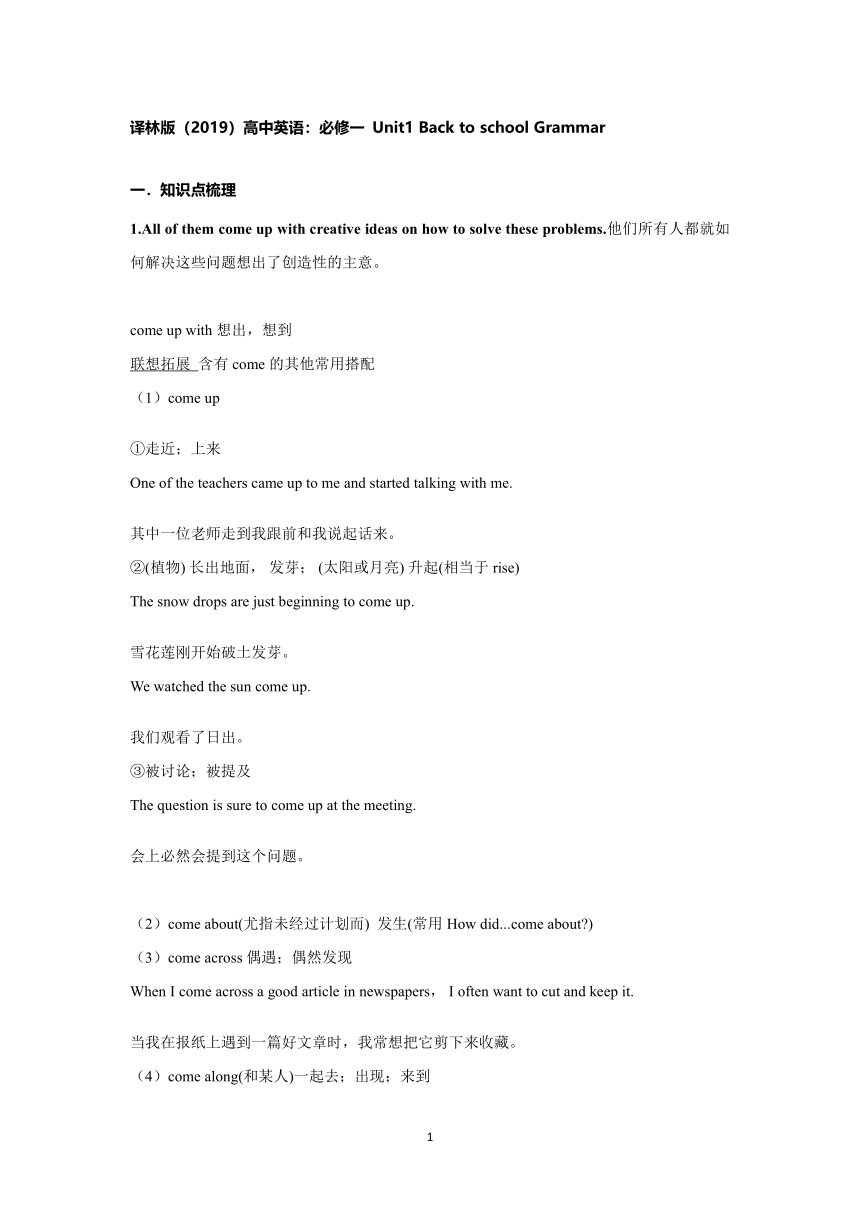
|
|
| 格式 | doc | ||
| 文件大小 | 59.5KB | ||
| 资源类型 | 教案 | ||
| 版本资源 | 牛津译林版(2019) | ||
| 科目 | 英语 | ||
| 更新时间 | 2021-08-19 00:00:00 | ||
图片预览

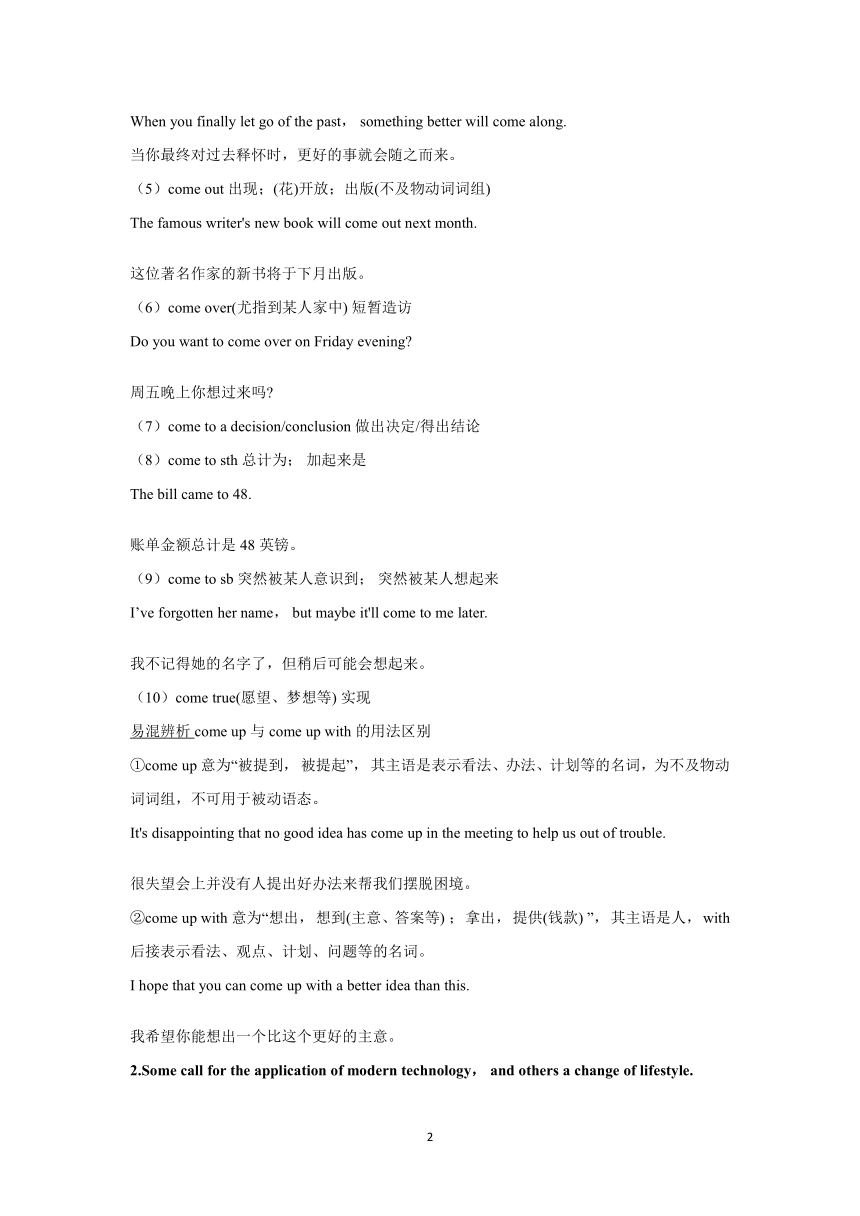
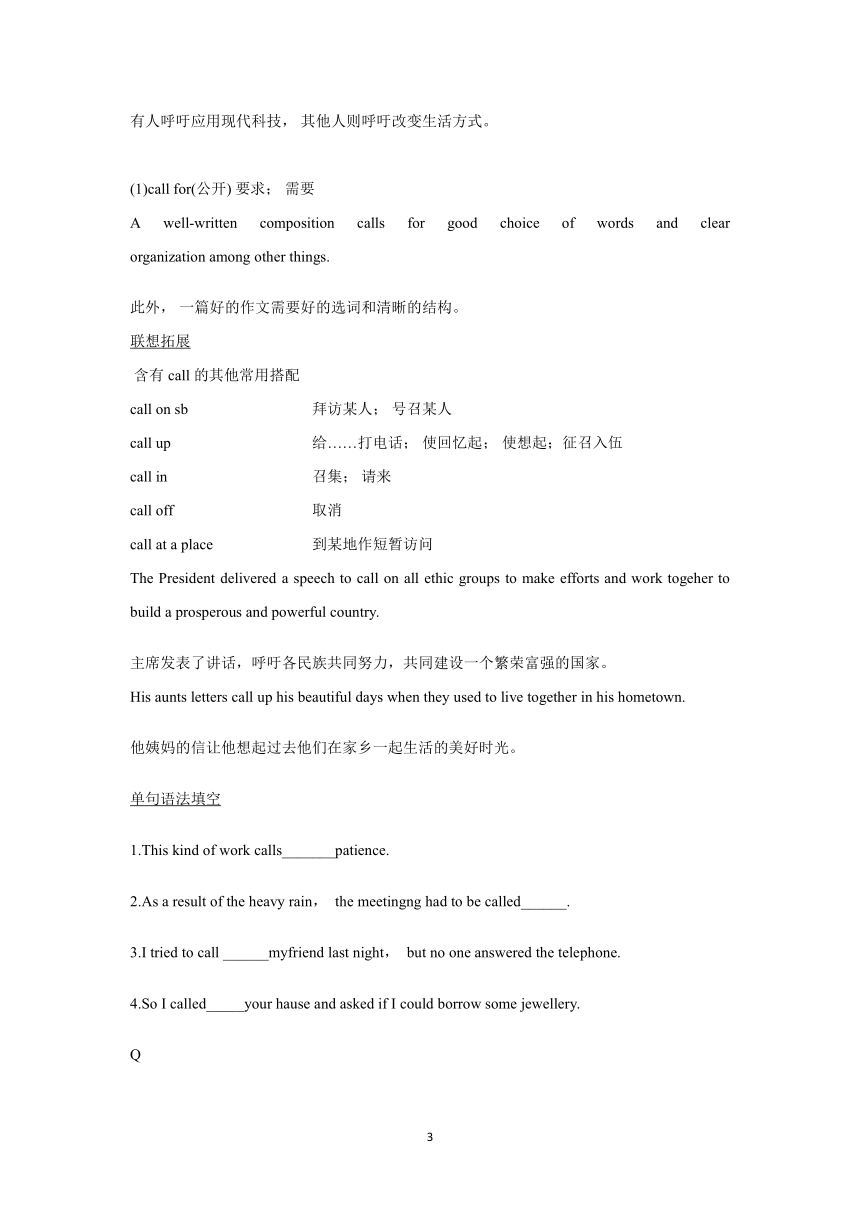
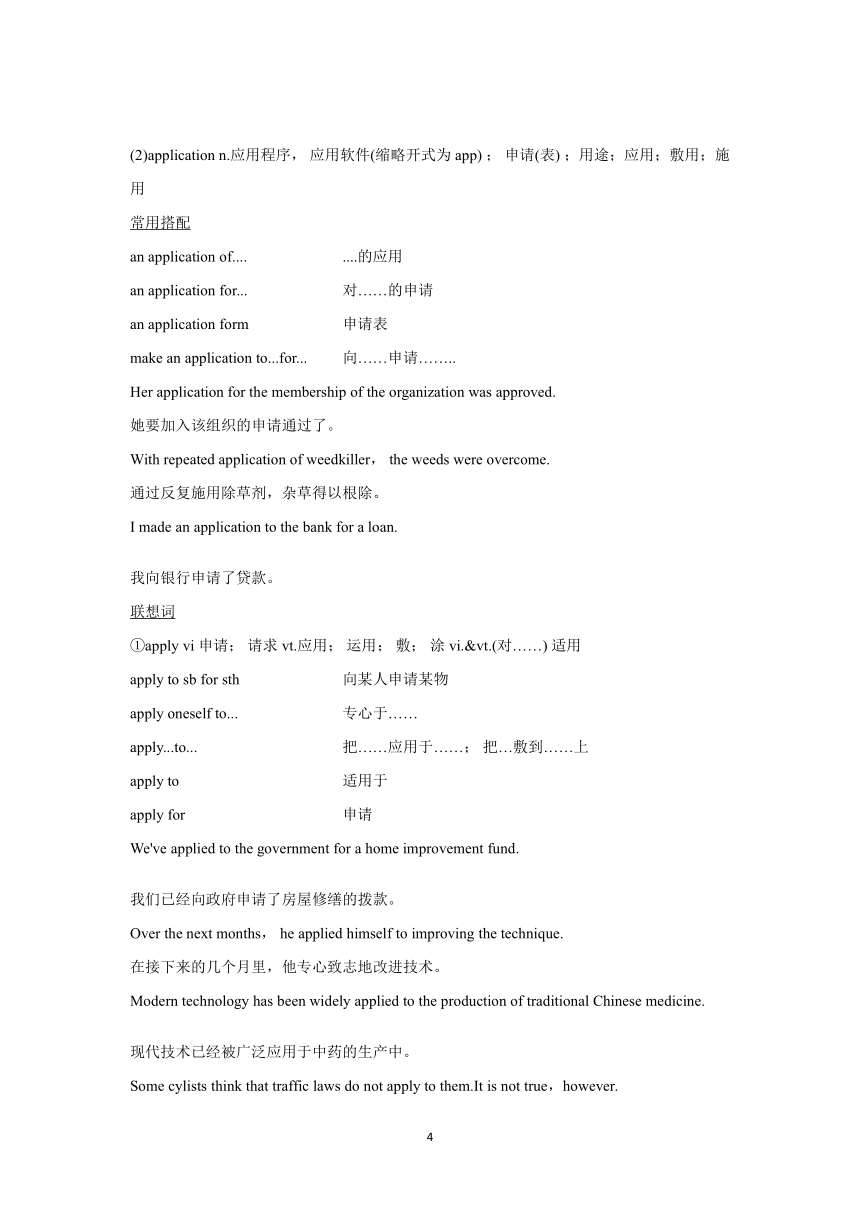
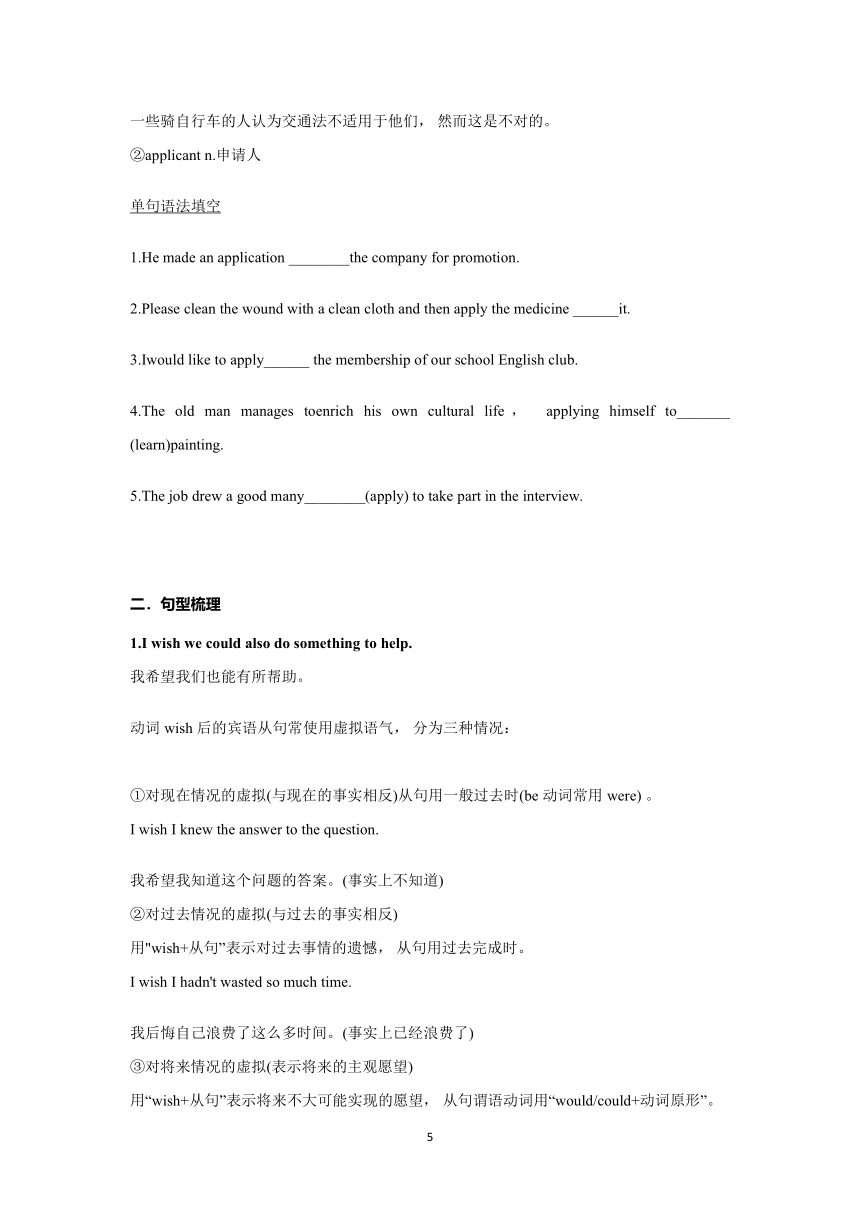
文档简介
译林版(2019)高中英语:必修一
Unit1
Back
to
school
Grammar
一.知识点梳理
1.All
of?them
come
up
with
creative
ideas
on
how
to
solve
these
problems.他们所有人都就如何解决这些问题想出了创造性的主意。
come?up?with想出,想到
联想拓展
含有come的其他常用搭配
(1)come?up
①走近;上来
One?of?the?teachers?came?up?to?me?and?started?talking?with?me.
其中一位老师走到我跟前和我说起话来。
②(植物)?长出地面,?发芽;?(太阳或月亮)?升起(相当于rise)
The?snow
drops?are
just?beginning
to
come
up.
雪花莲刚开始破土发芽。
We?watched?the?sun?come?up.
我们观看了日出。
③被讨论;被提及
The?question?is?sure?to?come?up?at?the?meeting.
会上必然会提到这个问题。
(2)come?about(尤指未经过计划而)
发生(常用How?did...come?about?)
(3)come?across偶遇;偶然发现
When?I
come
across
a
good
article?in
newspapers,?I?often?want?to?cut?and
keep?it.
当我在报纸上遇到一篇好文章时,我常想把它剪下来收藏。
(4)come
along(和某人)一起去;出现;来到
When?you?finally?let?go?of?the?past,?something?better?will
come?along.
当你最终对过去释怀时,更好的事就会随之而来。
(5)come?out出现;(花)开放;出版(不及物动词词组)
The?famous?writer's?new?book?will
come?out?next?month.
这位著名作家的新书将于下月出版。
(6)come?over(尤指到某人家中)?短暂造访
Do?you?want?to?come?over?on?Friday?evening?
周五晚上你想过来吗?
(7)come?to?a?decision/conclusion做出决定/得出结论
(8)come?to?sth总计为;?加起来是
The?bill
came?to?48.
账单金额总计是48英镑。
(9)come?to?sb突然被某人意识到;?突然被某人想起来
I’ve?forgotten?her?name,?but?maybe?it'll
come?to?me?later.
我不记得她的名字了,但稍后可能会想起来。
(10)come?true(愿望、梦想等)?实现
易混辨析come?up与come?up?with的用法区别
①come?up意为“被提到,?被提起”,?其主语是表示看法、办法、计划等的名词,为不及物动词词组,不可用于被动语态。
It's?disappointing?that
no?good?idea?has?come?up?in?the?meeting?to?help?us
out?of?trouble.
很失望会上并没有人提出好办法来帮我们摆脱困境。
②come?up?with意为“想出,?想到(主意、答案等)?;?拿出,?提供(钱款)?”,?其主语是人,?with后接表示看法、观点、计划、问题等的名词。
I?hope?that?you?can?come?up?with?a?better?idea?than?this.
我希望你能想出一个比这个更好的主意。
2.Some?call?for?the?application
of
modern?technology,?and
others
a
change?of?lifestyle.
有人呼吁应用现代科技,?其他人则呼吁改变生活方式。
(1)call?for(公开)?要求;?需要
A?well-written?composition?calls?for
good
choice
of
words?and?clear
organization?among?other?things.
此外,?一篇好的作文需要好的选词和清晰的结构。
联想拓展
?含有call的其他常用搭配
call?on?sb
拜访某人;?号召某人
call?up
给……打电话;?使回忆起;?使想起;征召入伍
call?in
召集;?请来
call?off
取消
call
at?a?place
到某地作短暂访问
The?President
delivered
a
speech
to
call
on
all
ethic?groups?to?make
efforts
and
work
togeher
to
build
a
prosperous
and
powerful
country.
主席发表了讲话,呼吁各民族共同努力,共同建设一个繁荣富强的国家。
His?aunts?letters?call?up?his?beautiful?days?when?they?used?to?live
together?in?his?hometown.
他姨妈的信让他想起过去他们在家乡一起生活的美好时光。
单句语法填空
1.This
kind
of
work
calls_______patience.
2.As
a
result
of
the
heavy
rain,
the
meetingng
had
to
be
called______.
3.I
tried
to
call
______myfriend
last
night,
but
no
one
answered
the
telephone.
4.So
I
called_____your
hause
and
asked
if
I
could
borrow
some
jewellery.
Q
(2)application?n.应用程序,?应用软件(缩略开式为app)?;?申请(表)?;用途;应用;敷用;施用
常用搭配
an?application?of....
....的应用
an?application?for...
对……的申请
an?application?form
申请表
make?an?application?to...for...
向……申请……..
Her?application?for?the?membership?of?the?organization?was?approved.
她要加入该组织的申请通过了。
With?repeated?application?of?weedkiller,?the?weeds?were?overcome.
通过反复施用除草剂,杂草得以根除。
I?made?an?application?to?the?bank?for?a?loan.
我向银行申请了贷款。
联想词
①apply?vi申请;?请求vt.应用;?运用;?敷;?涂vi.&vt.(对……)?适用
apply?to?sb?for?sth
向某人申请某物
apply?oneself?to...
专心于……
apply...to...
把……应用于……;?把…敷到……上
apply?to
适用于
apply?for
申请
We've?applied?to?the?government?for?a?home?improvement?fund.
我们已经向政府申请了房屋修缮的拨款。
Over?the?next?months,?he?applied?himself?to?improving?the?technique.
在接下来的几个月里,他专心致志地改进技术。
Modern?technology?has?been?widely?applied
to
the?production
of
traditional?Chinese?medicine.
现代技术已经被广泛应用于中药的生产中。
Some
cylists
think
that
traffic
laws?do?not?apply?to?them.It?is?not?true,however.
一些骑自行车的人认为交通法不适用于他们,?然而这是不对的。
②applicant?n.申请人
单句语法填空
1.He
made
an
application
________the
company
for
promotion.
2.Please
clean
the
wound
with
a
clean
cloth
and
then
apply
the
medicine
______it.
3.Iwould
like
to
apply______
the
membership
of
our
school
English
club.
4.The
old
man
manages
toenrich
his
own
cultural
life,
applying
himself
to_______
(learn)painting.
5.The
job
drew
a
good
many________(apply)
to
take
part
in
the
interview.
二.句型梳理
1.I?wish
we?could?also?do?something?to?help.
我希望我们也能有所帮助。
动词wish后的宾语从句常使用虚拟语气,?分为三种情况:
?
①对现在情况的虚拟(与现在的事实相反)从句用一般过去时(be动词常用were)?。
I?wish?I?knew?the?answer?to?the?question.
我希望我知道这个问题的答案。(事实上不知道)
②对过去情况的虚拟(与过去的事实相反)
用"wish+从句”表示对过去事情的遗憾,?从句用过去完成时。
I?wish?I?hadn't?wasted?so?much?time.
我后悔自己浪费了这么多时间。(事实上已经浪费了)
③对将来情况的虚拟(表示将来的主观愿望)
用“wish+从句”表示将来不大可能实现的愿望,?从句谓语动词用“would/could+动词原形”。
I?wish?someday?I?could?live?on?the?moon.
我希望有一天我能够生活在月球上。(未来很长一段时间里实现的可能性都不太大)
单句语法填空
1.I
can’t
get
help
from
my
parents
because
we
live
500
km
apart.I
wish
They_______(live)
with
me.
2.I
wish
you_______(call)earlier
yesterday.
3.I
wish
I_______(go)with
him
when
he
flies
to
England
next
week.
4.I
wish
it_______(be)spring
in
my
hometown
all
the
year
round.
5.He
wishes
he________(not
lose)
the
chance
when
he
was
young.
2.We?worked?for?several?hours?and
we?were?happy?to?see
that?the?forest?looked?cleaner?than?it?had?looked?before.
我们工作了几个小时,看到森林看上去比之前更干净了,我们很开心。
动词不定式(短语)作原因状语
表示喜、怒、哀、乐等的形容词作表语时,后可接动词不定式(短语)作原因状语,用以说明产生这种情绪的原因。常用于这类结构的形容词有surprised,sorry,
disappointed,
excited,
glad,?happy,
anxious,
delighted,pleased等。
He?was?astonished?to?hear?the?terrible?news.
听到这个坏消息他十分震惊。
We?were?surprised?to?know?that?the?meetings?were?held?secretly.
我们很惊讶地得知会议被秘密召开了。
I’ll
be?very?glad?to?accept?invitation?to?your?party.
我将非常愉快地接受去你的聚会的邀请。
单句语法填空
1.On
arriving
home,
she
was
surprised__________(find)her
door
open.
2.My
grandma,
living
separately
in
the
country,is
just
content
to
sit
comfortably
in
front
of
the
TV
each
evening,
happy__________(watch)
Chinese
opera
progranmes.
3.Tom
was
proud_______(choose)
captain
of
our
school
football
team.
语法-----省略
英语中,为了使语言简洁或避免重复,往往省去一个或一些句子成分,?这种语法现象叫作省略(Ellipsis)?,?这种省略后的句子称为省略句(Elliptical?Sentence)。
1.简单句中的省略
此类省略包括祈使句省略主语,某些句子结构省略谓语,部分问句同时省略主语和谓语,对话、疑问句的答语省略,感叹句的省略等。
(You)Come?andsee?me?tomorrow.
明天来见我。
(Im)So?pleased?to?meet?you?again!
很高兴再见到你!
What?a?nice?day(it?is)?!
天气真好!
(She?is)Such?a?clever?girl!
多聪明的女孩儿!
(Are?you)Ready?
准备好了吗?
?
Why(do)?not(you)say?goodbye?to?your?cousin?
为什么不和你的表亲说再见呢?
―Have?you?had?your?lunch?
你吃过午饭了吗?
-(I?have)?Not(had?my?lunch)?yet.
还没。
―What's?your?name?
你叫什么名字?
-(My?name?is)?John.
约翰。
2.并列句中的省略
并列句中,如果后面的分句有词语和前面的分句词语相同,为了避免重复,可以将后面分句中相同的部分省略。
She?could?have?lied?to?him,?but(she)?didnt.
她本可以对他撒谎的,但她并没有。
Some?of?them?were?injured,?but?most?of?them?were?not(injured)?.
他们中有一些人受伤了,但大部分没有。
I?work?in?a?factory?and?my?sister(works)?on?a?farm.
我在一家工厂上班,我姐姐在农场上班。
One?of?the?soldiers?was?killed?and?the?other(was)wounded.
其中一个士兵牺牲了,另外一个负伤了。
3.复合句中的省略
(1)对话中的省略
为了避免重复,对话中经常省略一些词句,在含宾语从句的复合句中更常见。
―Her?father?came?to?school?yesterday.
昨天她爸爸来学校了。
―I?know(that?her?father?came?to?school?yesterday)?.
我知道。
―When?will?he?be?back?
他什么时候回来?
—Who?knows(when?he?will?be?back)?.
谁知道呢。
(2)状语从句中的省略
状语从句中的省略现象非常普遍。当状语从句的主语和主句的主语一致,或状语从句的主语是it,且又含有be动词时,从句中通常省略主语和be动词。大部分状语从句中都有省略现象。
①由when,?whle,?as,?until,?once,?before等引导的时间状语从句
When(I?was)?young,?I?liked?this?cartoon?character?very?much.
小的时候我很喜欢这个动画人物。
He?bumped?into?a?car?while(he?was)on?his?way?here.
他在来这里的路上撞上了一辆汽车。
②由where,?wherever引导的地点状语从句
Fill?in?the?blanks?with?words?from?the?passage?where(it?is)necessary.
在必要的地方用文章中的词汇填空。
③由as,?as?if,?as?though引导的方式状语从句
As(it?was)expected,?he?los?this?job.
正如所预料的那样,?他丢了工作。
④由if,?unless等引导的条件状语从句常用的省略结构有:
if?so如果那样的话
if?not如果不行的话
if?anything要说真有什么的话
if?ever如果有过的话
if?necessary如果有必要的话
if?possible如果有可能的话
Lucy?is?very?shy?and?never?speaks?unless(she?is)?spoken?to.
露西很害羞,除非有人和她交谈,否则从不讲话。
If(it?is)necessary,?ring?me?up.
如果有必要的话,?请给我打电话。
?
特别注意
在含有were,?had,?should的虚拟条件从句中if可省略,?然后用倒装结构。
Should?it?breakdown,?we?would?fixit?at?our?own?expense.
万一它坏掉的话,我们将自己出资修理。
⑤由though,?although,?even?if,?even
though等引导的让步状语从句
Though(the?flat?is)not?large,?the?flat?is?well?equipped.
这个公寓虽然不大,但设施完备。
⑥由as/so...as,?than引导的比较状语从句
The?risks?are?greater?than?the?chances(are)?.
风险远比机会大得多。
I
have?always?lived?more?in?the?future?than
(I?have
lived)
in
the
present.
我总是生活在对未来的想象中,?而不是当下。
Fred?doesnt?calculate?so?accurately?as?Arthur(does)?.
弗雷德计算得不如阿瑟精确。
They?were?as?anxious?a?she?was(anxious)?.
他们像他一样焦急。
4.独立主格结构中的省略
在作状语的独立主格结构中,?分词短语being或having?been部分往往可以被省略。
The?work(having?been)
done,?the?secretary?left?the?office?and
went
home.
工作做完后,?秘书离开办公室回家。
The?weather(being)?fine,?we?decided?to?go?on?a?picnic?on?the?beach.
天气很好,我们决定到海滩野餐。
5.不定式结构中的省略
(1)保留动词不定式符号to
在同一个句子或联系紧密的对话中,为了避免重复,作宾语或宾语补足语的不定式再次出现时,不定式符号to后面的内容常常被省略,?只保留不定式符号to。这种情况常见于动词(词组)?refuse,?would
like,
?would?love,?wish,?want,?expect,?intend,?have,?need,?ought等以及表示情感的形容词afraid,?happy,?glad,?willing,?ready等之后。
I?asked?him?to?see?the?film,?but?he?didn't?want?to(see?it)?.
我叫他去看电影,但是他不想去。
―Will?you?join?us?
你愿意加入我们吗?
―Yes,?I'd?be?glad?to(join?you)?.
是的,?我愿意加入。
特别注意
如果省略的不定式内容中有be或作助动词的have时,?不定式符号to后要保留be或have或have?been。
―Are?you?a?farmer?
你是农民吗?
—No,?but?I?used?to?be(a?farmer)?.
不是,?但我曾经是。
(2)省去动词不定式符号to
①在see,?watch,?hear,?feel,?observe,?notice,?listen?to等感官动词(短语)?及make,?have,?let等使役动词之后作宾补时,?不定式要省略to。
I?watched?him?disappear?in?the?distance.
我看着他消失在远方。
②当but/except前有行为动词do的任何形式时,?后面的不定式要省去to。
We?could?do?nothing?but?wait.
我们别无选择只能等。
③当主语部分有行为动词do的任何形式时,作表语的不定式符号to可省略。
What?I?want?to?do?now?is?find?some?books?to?read.
我现在想做的事情就是找几本书读。
课堂练习
1.---The
movie
starts
at
8:30,
and
we
can
have
a
quick
bite
before
we
go.
---_______(sound)
great.See
you
at
8:10.
2.His
last
novel
sold
amazingly
more
than
ten
thousand
copies.We
hope
this
new
one
will
be
just______popular.
3.一Have
yougot
any
particular
plans
for
the
coming
winter
vacation?
—Yes,_____possible,I’m
going
to
visit
my
grandparents.
4.If________(accept)
for
the
job,
you'll
be
informed
soon.
5.Many
kids
develop
problems
from
finger
sucking
that
can
lead
to
life-long
problems
unless
_______(treat)properly.
6.Doctors
have
said
that
as
many
as
50%
of
patients
don't
take
medicine
as_________(direct)
.
7.Film
has
a
much
shorter
history,
especially
when_________(compare)with
such
art
forms
as
music
and
painting.
8.―You've
got
a
stomachache?But
we
at
eat
the
same
place.How
come
my
stomach
is
fine?
—You
have
anironstomach!Mine
isn't_____strong
as
yours.
9.Though______(surprise)to
see
us,
the
professor
gave
us
a
warm
welcome.
10._________(be)
it
not
for
the
support
of
the
teachers,
the
student
could
not
overcome
her
difficulty.
11.To
the
couple's
great
surprise,
the
house
was
in
a
mess
as
if_______(break)into.
12.Time,when_____(use)
correctly,
is
money
in
the
bank.
二、请把下列句子中省略的部分补充完整。
1.Someonee
has
used
my
pen,
but
I
don't
know
who______________________.
2._______________________
sorry
I've
kept
you
waiting
so
long.
3.He
has
gone,but
no
one
knows
where___________________.
4.Though____________________tired,they
went
on
working.
5.This
car
doesn't
run
as
fast
as
that
one______________________.
三、将下列句子改写成省略句。
1.The
little
girl
looked
anxious
as
if
she
was
in
trouble.
______________________________________________________________________________
2.
He
invitedme
togoto
the
cinema
with
himthis
evening,but
Idon't
want
to
goto
the
cinema
with
him.
______________________________________________________________________________
3.
Although
she
was
toldmany
times,she
still
made
the
same
mistake.
______________________________________________________________________________
4.
If
he
had
taken
my
advice,
he
would
feel
much
better
now.
______________________________________________________________________________
5.
They
don't
use
more
water
than
it
is
necessary.
______________________________________________________________________________
3.课后练习
Unit1
Back
to
school
Grammar
一.知识点梳理
1.All
of?them
come
up
with
creative
ideas
on
how
to
solve
these
problems.他们所有人都就如何解决这些问题想出了创造性的主意。
come?up?with想出,想到
联想拓展
含有come的其他常用搭配
(1)come?up
①走近;上来
One?of?the?teachers?came?up?to?me?and?started?talking?with?me.
其中一位老师走到我跟前和我说起话来。
②(植物)?长出地面,?发芽;?(太阳或月亮)?升起(相当于rise)
The?snow
drops?are
just?beginning
to
come
up.
雪花莲刚开始破土发芽。
We?watched?the?sun?come?up.
我们观看了日出。
③被讨论;被提及
The?question?is?sure?to?come?up?at?the?meeting.
会上必然会提到这个问题。
(2)come?about(尤指未经过计划而)
发生(常用How?did...come?about?)
(3)come?across偶遇;偶然发现
When?I
come
across
a
good
article?in
newspapers,?I?often?want?to?cut?and
keep?it.
当我在报纸上遇到一篇好文章时,我常想把它剪下来收藏。
(4)come
along(和某人)一起去;出现;来到
When?you?finally?let?go?of?the?past,?something?better?will
come?along.
当你最终对过去释怀时,更好的事就会随之而来。
(5)come?out出现;(花)开放;出版(不及物动词词组)
The?famous?writer's?new?book?will
come?out?next?month.
这位著名作家的新书将于下月出版。
(6)come?over(尤指到某人家中)?短暂造访
Do?you?want?to?come?over?on?Friday?evening?
周五晚上你想过来吗?
(7)come?to?a?decision/conclusion做出决定/得出结论
(8)come?to?sth总计为;?加起来是
The?bill
came?to?48.
账单金额总计是48英镑。
(9)come?to?sb突然被某人意识到;?突然被某人想起来
I’ve?forgotten?her?name,?but?maybe?it'll
come?to?me?later.
我不记得她的名字了,但稍后可能会想起来。
(10)come?true(愿望、梦想等)?实现
易混辨析come?up与come?up?with的用法区别
①come?up意为“被提到,?被提起”,?其主语是表示看法、办法、计划等的名词,为不及物动词词组,不可用于被动语态。
It's?disappointing?that
no?good?idea?has?come?up?in?the?meeting?to?help?us
out?of?trouble.
很失望会上并没有人提出好办法来帮我们摆脱困境。
②come?up?with意为“想出,?想到(主意、答案等)?;?拿出,?提供(钱款)?”,?其主语是人,?with后接表示看法、观点、计划、问题等的名词。
I?hope?that?you?can?come?up?with?a?better?idea?than?this.
我希望你能想出一个比这个更好的主意。
2.Some?call?for?the?application
of
modern?technology,?and
others
a
change?of?lifestyle.
有人呼吁应用现代科技,?其他人则呼吁改变生活方式。
(1)call?for(公开)?要求;?需要
A?well-written?composition?calls?for
good
choice
of
words?and?clear
organization?among?other?things.
此外,?一篇好的作文需要好的选词和清晰的结构。
联想拓展
?含有call的其他常用搭配
call?on?sb
拜访某人;?号召某人
call?up
给……打电话;?使回忆起;?使想起;征召入伍
call?in
召集;?请来
call?off
取消
call
at?a?place
到某地作短暂访问
The?President
delivered
a
speech
to
call
on
all
ethic?groups?to?make
efforts
and
work
togeher
to
build
a
prosperous
and
powerful
country.
主席发表了讲话,呼吁各民族共同努力,共同建设一个繁荣富强的国家。
His?aunts?letters?call?up?his?beautiful?days?when?they?used?to?live
together?in?his?hometown.
他姨妈的信让他想起过去他们在家乡一起生活的美好时光。
单句语法填空
1.This
kind
of
work
calls_______patience.
2.As
a
result
of
the
heavy
rain,
the
meetingng
had
to
be
called______.
3.I
tried
to
call
______myfriend
last
night,
but
no
one
answered
the
telephone.
4.So
I
called_____your
hause
and
asked
if
I
could
borrow
some
jewellery.
Q
(2)application?n.应用程序,?应用软件(缩略开式为app)?;?申请(表)?;用途;应用;敷用;施用
常用搭配
an?application?of....
....的应用
an?application?for...
对……的申请
an?application?form
申请表
make?an?application?to...for...
向……申请……..
Her?application?for?the?membership?of?the?organization?was?approved.
她要加入该组织的申请通过了。
With?repeated?application?of?weedkiller,?the?weeds?were?overcome.
通过反复施用除草剂,杂草得以根除。
I?made?an?application?to?the?bank?for?a?loan.
我向银行申请了贷款。
联想词
①apply?vi申请;?请求vt.应用;?运用;?敷;?涂vi.&vt.(对……)?适用
apply?to?sb?for?sth
向某人申请某物
apply?oneself?to...
专心于……
apply...to...
把……应用于……;?把…敷到……上
apply?to
适用于
apply?for
申请
We've?applied?to?the?government?for?a?home?improvement?fund.
我们已经向政府申请了房屋修缮的拨款。
Over?the?next?months,?he?applied?himself?to?improving?the?technique.
在接下来的几个月里,他专心致志地改进技术。
Modern?technology?has?been?widely?applied
to
the?production
of
traditional?Chinese?medicine.
现代技术已经被广泛应用于中药的生产中。
Some
cylists
think
that
traffic
laws?do?not?apply?to?them.It?is?not?true,however.
一些骑自行车的人认为交通法不适用于他们,?然而这是不对的。
②applicant?n.申请人
单句语法填空
1.He
made
an
application
________the
company
for
promotion.
2.Please
clean
the
wound
with
a
clean
cloth
and
then
apply
the
medicine
______it.
3.Iwould
like
to
apply______
the
membership
of
our
school
English
club.
4.The
old
man
manages
toenrich
his
own
cultural
life,
applying
himself
to_______
(learn)painting.
5.The
job
drew
a
good
many________(apply)
to
take
part
in
the
interview.
二.句型梳理
1.I?wish
we?could?also?do?something?to?help.
我希望我们也能有所帮助。
动词wish后的宾语从句常使用虚拟语气,?分为三种情况:
?
①对现在情况的虚拟(与现在的事实相反)从句用一般过去时(be动词常用were)?。
I?wish?I?knew?the?answer?to?the?question.
我希望我知道这个问题的答案。(事实上不知道)
②对过去情况的虚拟(与过去的事实相反)
用"wish+从句”表示对过去事情的遗憾,?从句用过去完成时。
I?wish?I?hadn't?wasted?so?much?time.
我后悔自己浪费了这么多时间。(事实上已经浪费了)
③对将来情况的虚拟(表示将来的主观愿望)
用“wish+从句”表示将来不大可能实现的愿望,?从句谓语动词用“would/could+动词原形”。
I?wish?someday?I?could?live?on?the?moon.
我希望有一天我能够生活在月球上。(未来很长一段时间里实现的可能性都不太大)
单句语法填空
1.I
can’t
get
help
from
my
parents
because
we
live
500
km
apart.I
wish
They_______(live)
with
me.
2.I
wish
you_______(call)earlier
yesterday.
3.I
wish
I_______(go)with
him
when
he
flies
to
England
next
week.
4.I
wish
it_______(be)spring
in
my
hometown
all
the
year
round.
5.He
wishes
he________(not
lose)
the
chance
when
he
was
young.
2.We?worked?for?several?hours?and
we?were?happy?to?see
that?the?forest?looked?cleaner?than?it?had?looked?before.
我们工作了几个小时,看到森林看上去比之前更干净了,我们很开心。
动词不定式(短语)作原因状语
表示喜、怒、哀、乐等的形容词作表语时,后可接动词不定式(短语)作原因状语,用以说明产生这种情绪的原因。常用于这类结构的形容词有surprised,sorry,
disappointed,
excited,
glad,?happy,
anxious,
delighted,pleased等。
He?was?astonished?to?hear?the?terrible?news.
听到这个坏消息他十分震惊。
We?were?surprised?to?know?that?the?meetings?were?held?secretly.
我们很惊讶地得知会议被秘密召开了。
I’ll
be?very?glad?to?accept?invitation?to?your?party.
我将非常愉快地接受去你的聚会的邀请。
单句语法填空
1.On
arriving
home,
she
was
surprised__________(find)her
door
open.
2.My
grandma,
living
separately
in
the
country,is
just
content
to
sit
comfortably
in
front
of
the
TV
each
evening,
happy__________(watch)
Chinese
opera
progranmes.
3.Tom
was
proud_______(choose)
captain
of
our
school
football
team.
语法-----省略
英语中,为了使语言简洁或避免重复,往往省去一个或一些句子成分,?这种语法现象叫作省略(Ellipsis)?,?这种省略后的句子称为省略句(Elliptical?Sentence)。
1.简单句中的省略
此类省略包括祈使句省略主语,某些句子结构省略谓语,部分问句同时省略主语和谓语,对话、疑问句的答语省略,感叹句的省略等。
(You)Come?andsee?me?tomorrow.
明天来见我。
(Im)So?pleased?to?meet?you?again!
很高兴再见到你!
What?a?nice?day(it?is)?!
天气真好!
(She?is)Such?a?clever?girl!
多聪明的女孩儿!
(Are?you)Ready?
准备好了吗?
?
Why(do)?not(you)say?goodbye?to?your?cousin?
为什么不和你的表亲说再见呢?
―Have?you?had?your?lunch?
你吃过午饭了吗?
-(I?have)?Not(had?my?lunch)?yet.
还没。
―What's?your?name?
你叫什么名字?
-(My?name?is)?John.
约翰。
2.并列句中的省略
并列句中,如果后面的分句有词语和前面的分句词语相同,为了避免重复,可以将后面分句中相同的部分省略。
She?could?have?lied?to?him,?but(she)?didnt.
她本可以对他撒谎的,但她并没有。
Some?of?them?were?injured,?but?most?of?them?were?not(injured)?.
他们中有一些人受伤了,但大部分没有。
I?work?in?a?factory?and?my?sister(works)?on?a?farm.
我在一家工厂上班,我姐姐在农场上班。
One?of?the?soldiers?was?killed?and?the?other(was)wounded.
其中一个士兵牺牲了,另外一个负伤了。
3.复合句中的省略
(1)对话中的省略
为了避免重复,对话中经常省略一些词句,在含宾语从句的复合句中更常见。
―Her?father?came?to?school?yesterday.
昨天她爸爸来学校了。
―I?know(that?her?father?came?to?school?yesterday)?.
我知道。
―When?will?he?be?back?
他什么时候回来?
—Who?knows(when?he?will?be?back)?.
谁知道呢。
(2)状语从句中的省略
状语从句中的省略现象非常普遍。当状语从句的主语和主句的主语一致,或状语从句的主语是it,且又含有be动词时,从句中通常省略主语和be动词。大部分状语从句中都有省略现象。
①由when,?whle,?as,?until,?once,?before等引导的时间状语从句
When(I?was)?young,?I?liked?this?cartoon?character?very?much.
小的时候我很喜欢这个动画人物。
He?bumped?into?a?car?while(he?was)on?his?way?here.
他在来这里的路上撞上了一辆汽车。
②由where,?wherever引导的地点状语从句
Fill?in?the?blanks?with?words?from?the?passage?where(it?is)necessary.
在必要的地方用文章中的词汇填空。
③由as,?as?if,?as?though引导的方式状语从句
As(it?was)expected,?he?los?this?job.
正如所预料的那样,?他丢了工作。
④由if,?unless等引导的条件状语从句常用的省略结构有:
if?so如果那样的话
if?not如果不行的话
if?anything要说真有什么的话
if?ever如果有过的话
if?necessary如果有必要的话
if?possible如果有可能的话
Lucy?is?very?shy?and?never?speaks?unless(she?is)?spoken?to.
露西很害羞,除非有人和她交谈,否则从不讲话。
If(it?is)necessary,?ring?me?up.
如果有必要的话,?请给我打电话。
?
特别注意
在含有were,?had,?should的虚拟条件从句中if可省略,?然后用倒装结构。
Should?it?breakdown,?we?would?fixit?at?our?own?expense.
万一它坏掉的话,我们将自己出资修理。
⑤由though,?although,?even?if,?even
though等引导的让步状语从句
Though(the?flat?is)not?large,?the?flat?is?well?equipped.
这个公寓虽然不大,但设施完备。
⑥由as/so...as,?than引导的比较状语从句
The?risks?are?greater?than?the?chances(are)?.
风险远比机会大得多。
I
have?always?lived?more?in?the?future?than
(I?have
lived)
in
the
present.
我总是生活在对未来的想象中,?而不是当下。
Fred?doesnt?calculate?so?accurately?as?Arthur(does)?.
弗雷德计算得不如阿瑟精确。
They?were?as?anxious?a?she?was(anxious)?.
他们像他一样焦急。
4.独立主格结构中的省略
在作状语的独立主格结构中,?分词短语being或having?been部分往往可以被省略。
The?work(having?been)
done,?the?secretary?left?the?office?and
went
home.
工作做完后,?秘书离开办公室回家。
The?weather(being)?fine,?we?decided?to?go?on?a?picnic?on?the?beach.
天气很好,我们决定到海滩野餐。
5.不定式结构中的省略
(1)保留动词不定式符号to
在同一个句子或联系紧密的对话中,为了避免重复,作宾语或宾语补足语的不定式再次出现时,不定式符号to后面的内容常常被省略,?只保留不定式符号to。这种情况常见于动词(词组)?refuse,?would
like,
?would?love,?wish,?want,?expect,?intend,?have,?need,?ought等以及表示情感的形容词afraid,?happy,?glad,?willing,?ready等之后。
I?asked?him?to?see?the?film,?but?he?didn't?want?to(see?it)?.
我叫他去看电影,但是他不想去。
―Will?you?join?us?
你愿意加入我们吗?
―Yes,?I'd?be?glad?to(join?you)?.
是的,?我愿意加入。
特别注意
如果省略的不定式内容中有be或作助动词的have时,?不定式符号to后要保留be或have或have?been。
―Are?you?a?farmer?
你是农民吗?
—No,?but?I?used?to?be(a?farmer)?.
不是,?但我曾经是。
(2)省去动词不定式符号to
①在see,?watch,?hear,?feel,?observe,?notice,?listen?to等感官动词(短语)?及make,?have,?let等使役动词之后作宾补时,?不定式要省略to。
I?watched?him?disappear?in?the?distance.
我看着他消失在远方。
②当but/except前有行为动词do的任何形式时,?后面的不定式要省去to。
We?could?do?nothing?but?wait.
我们别无选择只能等。
③当主语部分有行为动词do的任何形式时,作表语的不定式符号to可省略。
What?I?want?to?do?now?is?find?some?books?to?read.
我现在想做的事情就是找几本书读。
课堂练习
1.---The
movie
starts
at
8:30,
and
we
can
have
a
quick
bite
before
we
go.
---_______(sound)
great.See
you
at
8:10.
2.His
last
novel
sold
amazingly
more
than
ten
thousand
copies.We
hope
this
new
one
will
be
just______popular.
3.一Have
yougot
any
particular
plans
for
the
coming
winter
vacation?
—Yes,_____possible,I’m
going
to
visit
my
grandparents.
4.If________(accept)
for
the
job,
you'll
be
informed
soon.
5.Many
kids
develop
problems
from
finger
sucking
that
can
lead
to
life-long
problems
unless
_______(treat)properly.
6.Doctors
have
said
that
as
many
as
50%
of
patients
don't
take
medicine
as_________(direct)
.
7.Film
has
a
much
shorter
history,
especially
when_________(compare)with
such
art
forms
as
music
and
painting.
8.―You've
got
a
stomachache?But
we
at
eat
the
same
place.How
come
my
stomach
is
fine?
—You
have
anironstomach!Mine
isn't_____strong
as
yours.
9.Though______(surprise)to
see
us,
the
professor
gave
us
a
warm
welcome.
10._________(be)
it
not
for
the
support
of
the
teachers,
the
student
could
not
overcome
her
difficulty.
11.To
the
couple's
great
surprise,
the
house
was
in
a
mess
as
if_______(break)into.
12.Time,when_____(use)
correctly,
is
money
in
the
bank.
二、请把下列句子中省略的部分补充完整。
1.Someonee
has
used
my
pen,
but
I
don't
know
who______________________.
2._______________________
sorry
I've
kept
you
waiting
so
long.
3.He
has
gone,but
no
one
knows
where___________________.
4.Though____________________tired,they
went
on
working.
5.This
car
doesn't
run
as
fast
as
that
one______________________.
三、将下列句子改写成省略句。
1.The
little
girl
looked
anxious
as
if
she
was
in
trouble.
______________________________________________________________________________
2.
He
invitedme
togoto
the
cinema
with
himthis
evening,but
Idon't
want
to
goto
the
cinema
with
him.
______________________________________________________________________________
3.
Although
she
was
toldmany
times,she
still
made
the
same
mistake.
______________________________________________________________________________
4.
If
he
had
taken
my
advice,
he
would
feel
much
better
now.
______________________________________________________________________________
5.
They
don't
use
more
water
than
it
is
necessary.
______________________________________________________________________________
3.课后练习
